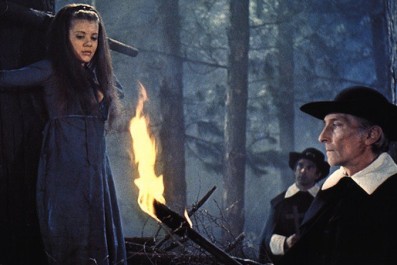
Ummmm. He’s the good guy…
In my quest for distraction, I started re-watching old Hammer Horror films. They are lush, know how to use color (which many have forgotten—looking at you BvS) and have a sensual tone. So yeah, some light fun. But I’ve never been a big fan. The scripts are…scant, to put it politely. There’s normally more holes than plot. Characters behave in whatever way the pseudo plot requires, FX is painfully bad (they bought the bats in one case at the local five and dime store), and no one at the company owns a map (work out the travel in The Horror of Dracula some time—try it). Plus there is the whole criminal misuse of Christopher Lee. But I can deal with those for some light fun.
But my God I’d forgotten the miserable morality. and that I can’t just forget. Hammer has the most backward, conservative to reactionary philosophy I recall at any major studio. Universal’s fright flicks were substantially more progressive thirty years earlier and RKO was epochs removed. First, there’s the view on sex. Sex is bad. Sex is very bad. Only bad people are interested in sex and they should, and generally are, punished for it. Now unfortunately that’s a common trope in horror cinema, but no one goes at it with just gusto. Why that stands out is the hypocrisy. Don’t sell your films on sex if you say sex is bad. Keep out those heaving bosoms. It gets worse with lesbianism. The Karnstein Trilogy is essentially a three film lecture on how lesbians suck (pun intended). Where there is girl-on-girl interest, much less action, there is pain and suffering and evil. Get that girl back into the arms of a man, and all is well—which they do literally in The Vampires Lovers. And like sex in general, the trilogy was sold on seeing girls with girls.
I don’t even know where to go with the puritan witch burners in Twins of Evil. They burn innocent girls, but hey, they mean well, and are godly, so realizing they may have stepped a bit over the line is sufficient. Sometimes you just burn innocent girls. It happens. No big deal as long as you kinda sorta regret it later. That slides into the strong religious feelings of Hammer. Again, film horror tends toward the conservative Christian in general, but Hammer takes it up a notch by having a film where the focus is that atheists are doomed.
I’m not even getting into their roles for women, except to say that apparently women are incapable of taking any action.
But perhaps the worst is lost on American audiences. Hammer has a huge affection for the old British class system. The rich are just better. Peasants don’t really count. Sure, all the big evil comes from the upper class but so does the great good. This is because anything that matters comes from the upper classes. Ah, but their films were about ye olden times, and that’s how things were. No, that’s how Britain romanticized things to be. And during WWII, the pop arts, with the government’s suggestion, went to work dismantling that, because it is hard to all “be in this together” if we’re not all equal. English cinema kept this up after the war, with that being the basis for most every Ealing comedy. So while everyone else was saying, “Class hierarchy is a thing of the past,” Hammer was saying, “Let’s get back to that past.” One could think it was just laziness, and partly it was. It is easier to just go with the class/religious hierarchy in horror films displaced in time. But it isn’t that much easier, and this isn’t something they could have missed. It was too important to Britain at the time. Artists, particularly film makers, were dwelling on a new social order. Hammer could not have been unaware. It was way too visible. But they shrugged and went, “You know, peasants are kinda dirty and stupid and do a rotten job of cleaning my car, and girls are scary and really shouldn’t talk or do anything but heave now and then, and anyone who isn’t an ultra conservative Christian should be kept out of polite society, and lesbians are icky—fun to look at for a moment, but icky.”
So yeah. Not a fan of Hammer Horror. Maybe some James Whale will help.